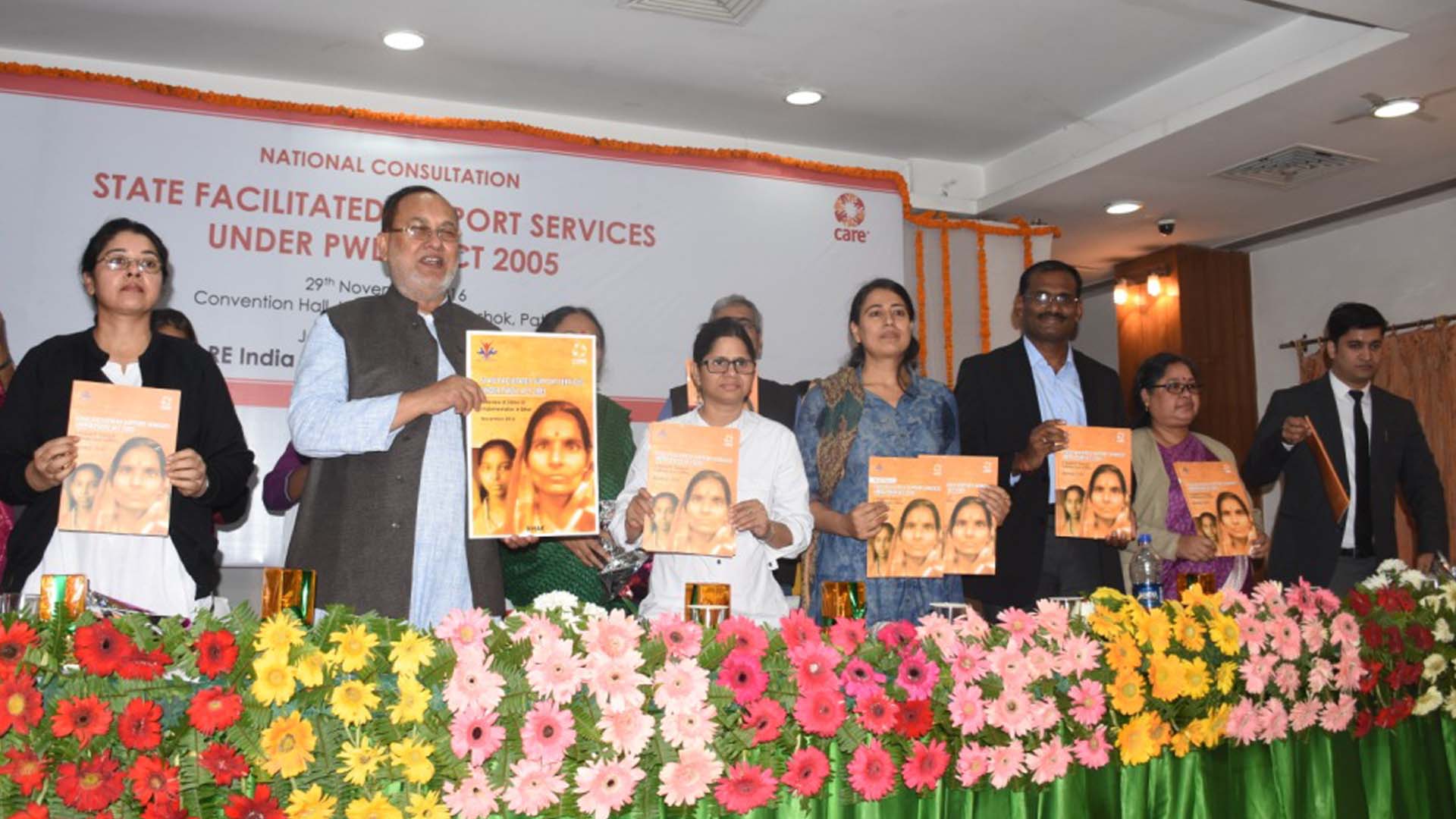
CARE India and Mahila Jagran Kendra’s joint study Report highlights serious gaps in the State-facilitated support Services under PWDV Act 2005 in Bihar
BCR NEWS (Patna/Bihar): CARE India in partnership with Mahila Jagran Kendra (MJK), released a study report highlighting vital gaps in implementation of the PWDV Act 2005 in Bihar, as a part of a roundtable conference in Patna, titled, “National Consultation: State-Facilitated Support Services Under PWDV Act, 2005 In Bihar”.
The consultation, organized by CARE India and MJK, aimed to widely disseminate the findings of the report on type and quality of services being offered by institutions and stakeholders to survivors and the challenges faced by the survivors in accessing justice. The study covers both rural and urban areas from nine districts of nine commissionaires in Bihar, while the selection of stakeholders was done based on the Act and the survivors were randomly selected from different socio-economic backgrounds.
The study report highlights the gap and quality of services being rendered by State facilitated Support Institutions and stakeholders and the experience of the survivors in accessing justice under PWDV act – Over 82% domestic violence victims remain dissatisfied with redressal of services by relevant institutions such as helplines, police stations, NGOs, and only 67% Protection Officers and 42% police stations register complaints.
Key findings of the study report include:
- 82% respondents dissatisfied with complaint redressal by government institutions such as helplines, police stations
- Only 72% of the stakeholders interviewed during the study could refer to the all the various provisions under the PWDV Act.
- Only 67% of the protection officers and 42% of police station In-charge, register cases.
- Only 60% of the key stakeholders could comprehend each other’s roles and responsibilities
- All survivors responded that lack of knowledge about various provision of the Act made them to run from one institution to another for relief.
- When survivors are sent to Short Stay Homes, services for protection and care for their children get compromised.
- Only 45% of the Protection Officers and Rehabilitation and Training Officers knew about the current fund allocations (Rs 2 lakhs in INR).
Releasing the study report today, Chief Guest on the occasion, Sri Abdul Bari Siddiqui, Hon’ble Minister, Finance, Government of Bihar said, “To ensure effective implementation of the Protection of Women from Domestic Violence Act (PWDV), 2005, we need to focus both on the legal and societal dimensions. The Government of Bihar is committed to strengthening the legal implementation of this Act. To ensure proper budgetary allocations for the same, we will invite Mahila Jagran Kendra and CARE India for deliberations during our next budgetary planning for Bihar. However, it is also important to recognize the importance of society’s contribution in making this act, a success. For this, the societal attitudes towards women, and women’s role in society, need to undergo a drastic change.”
On the Initiative, Dr Senthil Kumar, Executive Director, Programming Operations Quality and Learning, CARE India said,“ This study will benefit peer NGOs, government agencies, academics as well as implementing agencies nationally and internationally in increasing their knowledge and understanding the serious gaps that need to be addressed, factors and challenges that affect the lives of survivors of domestic violence. It can serve as a useful foundation to prepare necessary guidelines for implementing agencies and help them tackle ground level issues so that appropriate timely measures can be taken”.
Ms. Neelu, Chairperson, Mahila Jagran Kendra shared, “With the support of CARE-India, MJK is implementing the project ‘’Justice to Domestic Violence Survivors’’ in Patna and Samastipur districts of Bihar. It aims at generating awareness about the PWDV Act and sensitizing the stakeholders on issue of domestic violence. This study is expected to be a step forward in increasing interest and awareness on towards further research on women’s issues. It can be a useful tool for all organizations and stakeholders working on the subject.”
Domestic violence is widespread in South Asia. Countries such as India, Nepal, Bangladesh and Sri Lanka have promulgated several laws over the years, to criminalize domestic violence. However, the implementation of these laws remains a major challenge, as multiple barriers impede the implementation of these laws. CARE India’s advocacy efforts have been pushing for effective implementation of national laws pertaining to the prevention, prohibition and criminalization of domestic violence.
About CARE India
CARE has been working in India for over 65 years, focusing on ending poverty and social injustice, through well-planned and comprehensive programs in health, education, livelihoods and disaster preparedness and response. For FY 2015-16, CARE India directly reached out to 42.8 million people through 50 projects across 15 states, covering more than 183 districts.
The organisation’s overall goal is the empowerment of women and girls from poor and marginalized communities leading to improvement in their lives and livelihoods. CARE India a member of the CARE International Confederation working in over 85 countries, for a world where all people live in dignity and security. In India, CARE focuses on the empowerment of women and girls because they are disproportionately affected by poverty and discrimination and suffer abuse and violations in the realization of their rights, entitlements, access, and control over resources. Also, experience shows that, when equipped with the proper resources, women have the power to help whole families and entire communities overcome poverty, marginalization and social injustice

